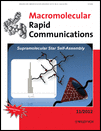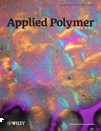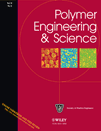
Journal of Macromolecular Science Part B-Physics
metrics 2024
Pioneering Insights in Materials Science
Introduction
The Journal of Macromolecular Science Part B-Physics, published by Taylor & Francis Inc, is a critical platform for advancing knowledge in the realms of macromolecular science and interdisciplinary research at the intersection of physics, chemistry, and materials science. With an ISSN of 0022-2348 and E-ISSN of 1525-609X, this journal has been a cornerstone of scientific discourse since its inception in 1967, continuing to offer invaluable insights and innovative findings through to 2024. The journal holds a Q3 ranking across several disciplines, including Chemistry (miscellaneous), Condensed Matter Physics, Materials Chemistry, and Polymers and Plastics, reflecting its relevance and importance within the scientific community. Although it does not support open access, the rigor of its peer-review process ensures that published articles meet the highest standards of scientific excellence. Researchers, professionals, and students alike will find the journal an essential resource for the latest trends and discoveries in macromolecular physics, aiding in both academic pursuits and practical applications in material design and analysis.
Metrics 2024
 0.26
0.26 1.20
1.20 1.30
1.30 54
54Metrics History
Rank 2024
Scopus
IF (Web Of Science)
JCI (Web Of Science)
Quartile History
Similar Journals

POLYMER BULLETIN
Connecting Researchers through Cutting-edge Polymer InsightsPOLYMER BULLETIN is a prominent journal in the field of polymer science, published by SPRINGER in Germany. Established in 1978, this peer-reviewed journal focuses on the latest research and developments in polymer chemistry, materials science, and condensed matter physics, boasting a commendable impact factor indicative of its rigorous academic standards. With a Q2 ranking in multiple categories including Chemistry (Miscellaneous), Condensed Matter Physics, Materials Chemistry, and Polymers and Plastics, POLYMER BULLETIN serves as an essential resource for researchers, professionals, and students aiming to stay abreast of innovative findings and methodologies within these interdisciplinary landscapes. Although the journal does not currently offer open access, it provides invaluable insights and data that significantly contribute to the advancement of polymer science. For more information and to access published articles, visit the journal's page on the Springer website.

MACROMOLECULAR RAPID COMMUNICATIONS
Fostering Collaboration through Swift Scientific CommunicationMACROMOLECULAR RAPID COMMUNICATIONS, published by WILEY-V C H VERLAG GMBH in Germany, is an esteemed journal dedicated to the rapid dissemination of high-quality research in the fields of materials chemistry, organic chemistry, and polymers and plastics. With a remarkable 2023 impact factor securing its place in the prestigious Q1 category across three key disciplines, the journal ranks impressively within the top quartiles of the Scopus metrics, standing at 36th in organic chemistry and 35th in polymers and plastics. Although the journal does not offer open access options, its informative depth and innovative research make it an invaluable resource for researchers, professionals, and students seeking to stay abreast of the latest developments in macromolecular science. Covering a broad spectrum of topics from fundamental research to applications, MACROMOLECULAR RAPID COMMUNICATIONS aims to foster collaboration and inspire further advancements within the scientific community.

POLYMERS & POLYMER COMPOSITES
Pioneering Insights in Polymer ApplicationsPOLYMERS & POLYMER COMPOSITES, published by SAGE Publications Ltd, is a prestigious journal dedicated to the exploration of significant advancements in the diverse fields of polymers, composite materials, and their innovative applications. With an ISSN of 0967-3911 and E-ISSN of 1478-2391, this journal plays a crucial role in the academic community, boasting an impressive ranking in the Q2 quartile across pivotal categories such as Ceramics and Composites, Materials Chemistry, and Polymers and Plastics in 2023. Positioned in the United Kingdom, it serves as a vital resource for researchers and professionals, providing insights into current trends and future directions in material science. Despite its availability not extending to Open Access, the journal aims to promote rigorous peer-reviewed research, thus fostering knowledge and collaboration among scholars. With publication convergence from 1993 to 2024, POLYMERS & POLYMER COMPOSITES stands as a cornerstone for those pursuing advanced understanding and excellence in material innovation.

Polymer Reviews
Driving excellence in biomedical engineering and beyond.Polymer Reviews, published by Taylor & Francis Inc, is an esteemed journal dedicated to the intricate and evolving field of polymer science. With its ISSN 1558-3724 and E-ISSN 1558-3716, the journal has established a significant presence among researchers and practitioners alike, evidenced by its impressive categorization in the Q1 quartiles across multiple disciplines, including Biomedical Engineering, Materials Chemistry, and Renewable Energy. Since its inception in 2006 and continuing through 2024, Polymer Reviews has consistently aimed to advance the knowledge base of polymer applications and innovations, providing a platform for comprehensive review articles that stimulate further research and inspire practical solutions. The journal, ranking within the top percentile across several Scopus categories, underscores its impact and relevance in a rapidly developing scientific landscape. Though not an open-access journal, it remains a vital resource for those invested in the future of materials science and engineering.

ACS Macro Letters
Elevating Chemical Research with Timely DiscoveriesACS Macro Letters, published by the American Chemical Society, is a leading journal in the fields of Inorganic Chemistry, Materials Chemistry, Organic Chemistry, and Polymers and Plastics. Established in 2012, this journal has swiftly ascended to the forefront of chemical research with an impressive reputation, as evidenced by its 2023 Scopus rankings placing it in the first quartile across multiple categories. The journal's objective is to disseminate timely and concise articles that advance the study of macromolecules and their applications, making it an essential resource for researchers, professionals, and students alike. With a focus on fostering innovation and facilitating collaboration within the chemical community, ACS Macro Letters presents a robust platform for scientists to share their groundbreaking findings. Being based in the United States, it serves as a central hub for global discourse in the chemical sciences, although it does not currently offer Open Access options. The journal's commitment to high-quality content is further underscored by its prestigious impact factor and acceptance into elite academic quartiles, signifying its influence and importance in shaping future research.

Polymers
Advancing polymer science for a sustainable future.Polymers is a premier journal published by MDPI, dedicated to advancing the field of polymer science and technology. This open-access journal, established in 2009, has quickly gained prominence in the academic community, serving as a vital platform for disseminating high-quality research articles, reviews, and communications in the realms of chemistry, polymers, and plastics. Based in Switzerland, with an impressive ranking in the Q1 quartile for both Chemistry and Polymer studies, Polymers boasts a significant impact factor, reflecting its rigorous peer-review process and esteemed editorial board. Researchers, professionals, and students alike benefit from the broad accessibility of content, allowing for a more extensive reach and engagement within the scientific community. As a key resource for the latest advancements and innovations in polymer research, Polymers continues to lead discussions, inspire collaborations, and foster the development of novel materials that shape various industrial applications.

POLYMER SCIENCE SERIES C
Unveiling the Future of Polymer SciencePOLYMER SCIENCE SERIES C is a distinguished journal published by MAIK NAUKA/INTERPERIODICA/SPRINGER, focusing on advancing research in the fields of polymer science and materials chemistry. With an ISSN of 1811-2382 and an E-ISSN of 1555-614X, this journal has been actively disseminating vital findings since its inception in 2000, aiming to converge knowledge and innovations until 2024. Operating out of the United States, it stands out with its current quartile rankings of Q3 across several categories, including Chemistry (miscellaneous), Materials Chemistry, and Polymers and Plastics, highlighting its evolving significance in the academic community. Despite its open access status, the journal attracts an engaged audience of researchers, professionals, and students, providing a platform for the publication of rigorous peer-reviewed articles that explore the intricacies of polymer synthesis, characterization, and applications. POLYMER SCIENCE SERIES C not only serves as a vital resource for keeping abreast of recent developments in polymer research but also stimulates interdisciplinary collaborations and innovative approaches in material science.

Express Polymer Letters
Bridging Disciplines in Polymer ScienceExpress Polymer Letters is a leading open-access journal published by BUDAPEST UNIVERSITY OF TECHNOLOGY AND ECONOMICS, focusing on the fast-paced realm of polymer science and engineering. With a broad scope that encompasses the interdisciplinary fields of Chemical Engineering, Materials Chemistry, and Organic Chemistry, the journal serves as a crucial platform for researchers and professionals dedicated to advancing knowledge and innovation in polymer-related disciplines. Since its inception in 2007, it has consistently provided high-quality, peer-reviewed research and has achieved a respectable impact within various categories, evidenced by its Q2 quartile rankings across multiple Scopus categories and its competitive standings in the field. The journal's dedication to open access ensures that research is widely disseminated, promoting transparency and collaboration within the academic community. Positioned to converge into the future, Express Polymer Letters remains an essential resource for cutting-edge studies and developments, with an anticipated convergence period extending through 2024.

JOURNAL OF APPLIED POLYMER SCIENCE
Pioneering Discoveries in Polymer ScienceThe Journal of Applied Polymer Science, published by Wiley, is a leading journal in the field of polymer science, showcasing innovative research and applications in various domains since its inception in 1959. With an ISSN of 0021-8995 and an E-ISSN of 1097-4628, it is indexed in prominent databases, maintaining a strong presence with Scopus rankings placing it in the Q2 category across multiple disciplines, including Chemistry, Materials Chemistry, and Polymers and Plastics. The journal’s commitment to advancing scientific knowledge is reflected in its impact on the materials science community, with noteworthy rankings such as #38 in Surfaces, Coatings and Films and #51 in Polymers and Plastics. Though not an open-access publication, it remains a vital resource for researchers, professionals, and students aiming to deepen their understanding of polymer applications and to stay abreast of the latest developments in this ever-evolving field. With a focus on high-quality research, the Journal of Applied Polymer Science continues to be a cornerstone for those engaged in polymer research and its myriad applications.

POLYMER ENGINEERING AND SCIENCE
Shaping the Future of Polymer EngineeringPOLYMER ENGINEERING AND SCIENCE, published by WILEY, is a premier journal specializing in the field of polymer science and engineering. Since its inception in 1961, this journal has been at the forefront of disseminating high-quality research, focusing on various aspects of polymers and plastics, including their chemistry, properties, and applications. With an impressive impact factor, it ranks in the second quartile (Q2) across multiple categories, including Chemistry (Miscellaneous), Materials Chemistry, and Polymers and Plastics, showcasing the journal's significance and influence in these vital areas of research. Researchers and professionals in academia and industry will find the latest advancements and innovative methodologies in polymer science, making this journal an essential resource for those looking to stay updated on cutting-edge developments. While it does not currently support Open Access, its comprehensive scope and critical insights positioned it as a valuable platform for advancing knowledge and fostering collaboration within the polymer community. The journal’s office is located at 111 River St, Hoboken 07030-5774, NJ, United States, emphasizing its strong presence in the academic landscape.